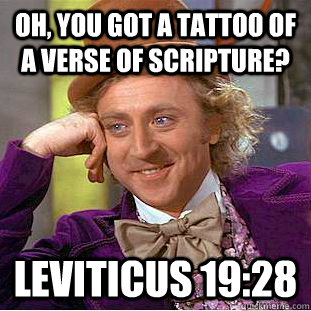
Perhaps my most anticipated and requested notes for a lecture was on tattoos for my Pentateuch class this Spring. While I currently do not write out manuscript notes for my classes (I am more a skeletal outline lecturer), I do hand out notes for reading and discussion. While quite delayed in posting this (it has been a draft for months), I thought I would at least share the comments of a friend (with his permission) and link to another article I provided in class that day.
Timothy McMahon writes:
First, it’s difficult to ascertain precisely what Leviticus 19:28 is prohibiting. It says “you shall not put a writing of qa’aqa on yourselves. Since qa’aqa occurs nowhere else in the Bible, its precise meaning is uncertain. The Septuagint rendered grammata stikta, ‘tattoo marks’. But that may or may not be entirely accurate.
The overall subject of the immediate context is alternative worship — the worship of idols, ancestor veneration, and occult activity. It was a widespread custom in the ancient near east to mark the body of a slave to signify his master’s ownership. Since the worshipers of a god are the god’s slaves (Scripture uses this terminology quite often to describe HaShem’s people as His servants), it was also very common for people to imprint the name or symbol of their god on their bodies to mark themselves as his worshipers. In the confluence of the literary and cultural contexts, it seems reasonable in my view to understand the prohibition here as against imprinting or branding oneself in honor of a god other than HaShem, rather than an absolute prohibition on any such markings.
The rabbis also see it this way (depending on the source). In the Tosefta to Makkot 4.15, this verse is understood to prohibit the tattooing of the name of a false god. The rabbis here cite the custom enshrined in the Torah of boring a hole through a slave’s ear (Ex. 21:6; Deut. 15:17) to understand that this prohibition is not absolute. (Interestingly, there’s an alternate understanding that Lev. 19:28 prohibits only the incision of the Name of God and permits any other sort of tattoo. I can’t track down the source on that yet.)
Support for the Tosefta‘s understanding, I believe, may be found in Isaiah 44:5 — “One will say, ‘I am HaShem’s’; another will call himself by Jacob’s name; another will write on his hand, ‘HaShem’s’ and name himself with the name Israel.” This verse appears to speak approvingly of the idea of inscribing HaShem’s name on one’s hand, just as He (figuratively, of course) has engraved His people on His hands (Isaiah 49:16). (Alternatively, 44:5 could be rendered “another will write with his hand, ‘HaShem’s’.”)
An article at Studylight.org offers a discussion along a similar line concerning the taboo of tattoos (HERE).
In sum, I would say that much of the contemporary obsession with tattoos is unrelated to the instruction concerning body marking in the Scriptures (and particularly Leviticus), unless it is for religious purposes intentionally meant for syncretistic or idolatrous worship. That doesn’t mean it is a non-issue (there are still dumb things to tattoo on your body and dumb ways to do it).
What are your thoughts in light of these several articles discussing the Scriptures on this topic?
